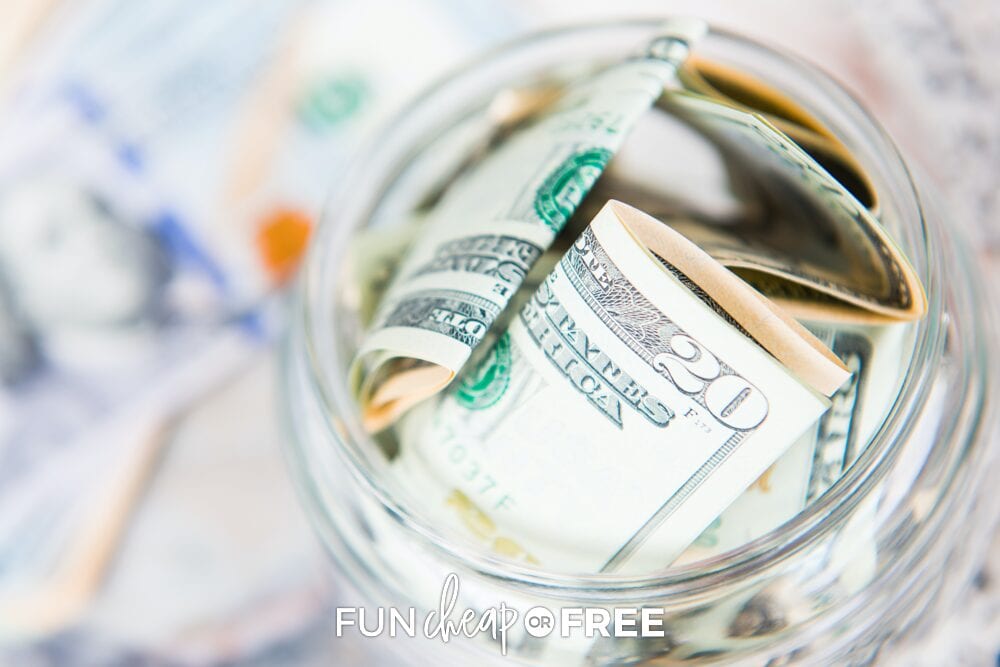Setting financial goals can seem like a daunting task, but it's really not! Use these tips to not only set your goals but reach them. If you're not sure where to start, check out these great ideas for you and for your family! We've got this!

Financial goals – we all have 'em, yet they can seem so difficult to reach! While it can seem like a scary subject, it's such a CRUCIAL one that deserves thought and discussion. In order to reach your dreams and be able to do all of the things you want to do (Disney, anybody?) or buy the things that you'd like to buy (hello, new house!), you've got to make sure that your money is in order.
*Note: When you click the links in this post, we may receive a commission at no extra cost to you.
If you're already breathing into a paper bag, don't worry! We're going to walk through each step it takes to set your financial goals. You'll have them figured out and a plan to reach them in no time! We've also got some financial goals you might want to consider setting if you haven't already. If you're going through this much trouble to think it out and write it down, you might as well have all of your bases covered!
So, without further ado, let's get on to…
HOW TO SET FINANCIAL GOALS
It is so, so, SO important to set financial goals in your life! This is the first step in your financial plan. Before you can start working on your finances and saving money, you've got to have clear, defined goals. This will allow you to know exactly how much money you need to save and for what purpose. So take out your favorite pen and paper and let's get to work!
WHY DO YOU WANT TO REACH YOUR FINANCIAL GOALS?

As you sit down and get ready to declare your financial goals, consider what your reason for each specific goal is. Why do you want to reach your goals? Money is so much more than numbers on a spreadsheet. Money can represent all that you have created, sacrifice, value, hard work, and discipline.
Rather than shooting for a large account balance, think about your “why.” This is more valuable to you than money itself. It has to do with the values you most cherish. So, identify what values are most important and make goals that correspond to those values. Once you “find the why,” then you'll be more motivated to see your goals to the end! Sit down and really think them through. You'll be amazed at how determined you can become once you fully know WHY you're setting these financial goals.
DECLARE YOUR FINANCIAL GOALS
First off, you need to declare the type of goal you're setting by stating what you want to accomplish. This is probably the easiest part, as it simply requires you to figure out where you want to focus so you can write it down!
Maybe it's a personal goal, like making your own cocoa, favorite fountain drink, or other copycat drinks at home to save money. You may want to pay off debt. Or maybe you want to work on your long-term savings so you'll have that down payment for a house when the time is right.
You might even have a vacation your family wants to go on, but you've never been able to afford it. It may be time for a new van because your family has outgrown your old one (not speaking from experience here, or anything!), and you've got to be able to work a new car payment into your monthly budget. Whatever it is, figure out exactly what you want to accomplish before moving on.
DEFINE YOUR GOALS

Next, you need to define what your end goal is. We're getting a bit more intense here. It's not enough to just declare your goal. It's easy to say you want to save more money or pay off debt. We all want that! If you are to have any level of success, you have to get specific. “I will pay off $5,000 in debt by December,” or “I will save and invest $500 every month.” is much better than saying, “I'm going to get out of debt and save more.”
This is where you'll have to figure out a specific amount of money you're aiming for. For example, say one of your goals is to decrease your grocery budget. First, you have to determine how much you usually spend on groceries and how much you want to cut back to. Some things worth considering:
- Do you want to pay off all of your debt, or only your pressing debt with high-interest rates, like credit cards?
- How much of a down payment do you need to save for your dream home?
- Where is your dream vacation and how much will it cost your family to go?
- How much will the new car payment be that you've got to work in your monthly budget?
- Will you have to cancel some other things in your budget you don't necessarily need to ensure you'll be able to fit that new payment into your budget?
With these questions in mind, figure out an exact amount of money so you know how to plan for it!
SET A DEADLINE FOR YOUR FINANCIAL GOALS
Okay, now that you know what your financial goals are and how much money you'll need to reach them, you're ready to set a deadline for them! It's easy to say “Oh, we'll put money into our savings account as we have it leftover.” It's a lot harder to stick to that if you don't have a plan and deadline for reaching that goal.
The best thing to do is set a firm deadline for your goal and work your way backward to figure out how much time you'll need to be able to save for it. Are you planning to cut back on eating out in order to use that money for something else in the near future? How quickly do you need to pay off your debt? What date do you need to have your down payment saved by? When do you want to go on your vacation? What time frame are you working with to fit your new car payment into your budget?
SET WEEKLY/MONTHLY GOALS

Once you have your deadline figured out, work your way back so you can determine measurable monthly, weekly, and even daily goals. Goals need to be measurable to work! If you don't track them, how will you know you're on the right path??
To measure goals, break them down even further. Rather than saying “I will pay off $5,000 in debt by December,” try “I will pay off $400 of debt per month.” Smaller, measurable goals will keep you motivated. Plus they're less overwhelming, which naturally means more attainable!
Make sure you're not aiming for a goal that's too large because you'll end up just feeling discouraged. Ain't nobody got time for that! Sure, it's important to create goals that will stretch you, but make sure you can still reach them. Every time you reach a smaller goal, it will give you confidence and inertia to move forward and reach your next goal!
If you need to save $12,000 for a down payment on a house, and you're hoping to move in two years, then that comes to $500 per month you would need to save. That's about $125 per week or $13 per day. That's really not so bad once you break it down like that! Stick to your grocery budget, do a few spending freezes, and stop eating out and you could reach that goal easily!
TRACK YOUR GOALS
Use our free printables to help keep track of everything! Our money-saving charts will help keep you motivated to save for your dream goals. Our debt tracker will help you stay on track to crush your debt!
CELEBRATE REACHING YOUR FINANCIAL GOALS

Yay, you've finally reached your goal! Now what? Do you keep trucking on or take a break for a little bit? Before you do anything else, you need to treat yourself and celebrate your success in reaching your goal! You choose the best way to celebrate, but make sure you recognize your successes before moving on to the next one.
TYPES OF FINANCIAL GOALS YOU SHOULD CONSIDER SETTING
We suggest having multiple bank accounts (at least seven, actually!) to help us reach our financial goals. Below, you'll get a sneak peek of those goals, along with a few others that you should definitely consider setting.
EMERGENCY SAVINGS
The emergency savings account should have enough money for you to be able to live off of for 6-12 months. It's an “out of sight, out of mind” account that you should only ever touch in dire circumstances! Check out this 7 bank accounts post to get all of the deets.
LONG-TERM SAVINGS

Your long-term savings account is where you'll keep the money you're saving for your big-ticket items, like the down payment on a house. This is where your money should go for planned future expenses.
It's also where you keep the money for unexpected expenses, such as an unexpected home repair. Read more about establishing financial banking goals HERE.
SLUSH FUND
The slush fund is also known as your fun money account! If you have a vacation you're saving up for, but you can't fit it into your normal budget, then take any extra money you have at the end of the month and put it into this account. Once you set this financial goal, work really hard to stick to (or under your budget) and you'll get it built up in no time!
HEALTH SAVINGS ACCOUNT
If you don't have an HSA account, then you should really consider setting this as a new financial goal! A health savings account is a tax-free savings account that's made to hold money for any health-related expenses. This could be anything from paying for prescriptions to paying medical bills. The tax savings alone make this account worth it! Read more about HSAs and how much you should keep in them.
RETIREMENT ACCOUNT
There are a lot of different retirement accounts you can be putting your hard-earned money into for the future, such as a 401K or Roth IRA. We're not going to tell you what kind of account you need to use, but saving money for retirement is definitely a financial goal you need to think about sooner rather than later!
BECOME DEBT-FREE
If one of your financial goals is to become debt-free, then boy, have you come to the right place! Have you heard of our awesome online budgeting program, Budget Boot Camp? It's a crazy fun video program that makes money easy to understand. Seriously! All you need is a screen and you're good to go.
If you don't save AT LEAST what you paid for the program, we'll refund every dime. You've really got nothing to lose! Use the code FCFBLOG to get an extra 10% off because you're awesome and you deserve it!
TITHING/DONATION TO CHARITY
We firmly believe in giving back to what you feel passionate about! We recommend saving 10% of your take-home income and giving it to your church or charity of choice.
BECOME FINANCIALLY SECURE
In order to become financially secure, you've got to take control of your finances! The first step for that is to start budgeting and being purposeful with your money. We highly recommend reading our post on the 70% rule – it will really help you figure out where to put all of your money and give it a purpose!
KIDS' SAVINGS ACCOUNTS

You should also consider setting financial goals for your kids! Give your kids a place to put the money they earn from allowance, jobs, birthdays, and holidays. Teach your kids about money and help them save for their most-wanted items with our free kid's savings tracker!
It's also wise to set up accounts you can put money into for their futures, whether it's for a car, college, religious mission, or something else. To read more about saving for your kids' futures, read that section in our 7 bank accounts post.
MAKE MORE MONEY
Is one of your financial goals to make more money? You may want to look for a higher-paying job. If you love your job, but it just doesn't bring in enough money, consider getting a side job! We have some great posts for ya! Go check out how to make money from home right now, 12 apps that you can use to earn money, and side hustles you can do from home.
YOU CAN REACH YOUR FINANCIAL GOALS
Alright, well there you have it! You now have the tools to set yourself up for success as you're setting financial goals. We have all made finance goals in the past. The question is, can we keep them? Remember, the true test of character is the ability to carry out a decision, long after the decision has been made. Reaching your money goals will require you to be disciplined, but if you follow the proper steps in setting your goals, you can totally do this!!
What are the specific goals that you're working on? Share with us in the comments, so we can give you encouragement and tips! 🙂

Looking for more?
- Help to make managing your money easier by dividing your financial responsibilities with your spouse!
- Learn about the simplest budgeting method EVER.
- Check out how we budget for extracurricular activities for kids.
Happy goal setting!

0 Comments